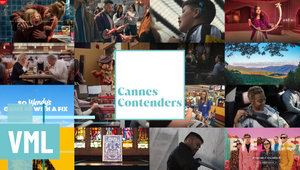
Your Shot: Shell Wants to Run London’s Buses on Waste Coffee Grounds

It’s been vital in recent years for energy giants like Shell to emphasise the good they’re doing to help human society make its transition to a cleaner, more sustainable future. And they can’t just pay lip service - people won’t be fobbed off. They have to actually DO something. With this in mind, J. Walter Thompson London have been working on Shell’s #makethefuture initiative, which supports entrepreneurs whose innovations can have a positive impact on humanity.
The latest chapter in the story is bio-bean - a technology that turns waste coffee grounds, from the 2.3 cups the average Londoner drinks daily, into biofuel which could power buses around the city.
LBB’s Laura Swinton checked in with Jonathan Terry, Head of Live, Creative at JWT London, to find out what - apart from a lot of coffee - went into this innovative project.
LBB> This project follows up on the Rio kinetic energy-powered football pitch - I imagine it must have been daunting to follow up such a successful campaign! What were your starting points?
JT> Yes, it was a bit. After the success of the football pitch, we realised we had a model: 1. Find an existing prototype technology. 2. Find a societal problem. 3. Use the technology to solve the problem at scale. 4 Celebrate and amplify. Which is what we did this time around. It just took an awfully long time to deliver.
LBB> How did you come across the bio-bean technology?
JT> We monitor the entries to funding platforms that focus on new energies. bio-bean entered one. At the time, it was just a one-paged website, but the premise of using waste coffee to create energy was instantly compelling.
LBB> And why was it the perfect partner for this leg of the #makethefuture campaign?
JT> We like the fact that it would be activated here in the UK. Often we’ve activated abroad, so to do something in the developed world made a change. Sometimes focusing on the developing world appears more attractive because they - arguably - need more support. This time, we’re making London a smarter city.
LBB> How did you go about developing the bus?
JT> Buses, plural! First thing was to test the coffee oil, which is the first stage. This was sent to a facility to be blended into B20 bio diesel. It must pass several tests to ensure it works efficiently in engines, which it did. The next bit was getting it into official London buses, which was the hardest bit. There have been problems with different types of bio-diesel in the past, so we had a big job of convincing the operators that this was going to work. Obviously it did work, and had no impact on engine or pump performance, which are the two potential issues.
LBB> Right now the issue of air quality is a massive issue in London - so this really is newsworthy. How did that news angle play into how you developed the comms and campaign?
JT> Yup, what’s great is this is a story with layers. The high concept of coffee powered buses is a great start, you then have the emissions and Co2 reduction and the final layer is smarter use of waste. All three are played out differently in different contexts.
LBB> So what does Shell's support of bio-bean entail?
JT> Initially funding, from three different platforms. As we went along, we provided operational support in liaising with the various authorities. But, really, we are here to support bio-bean in any way we can. It’s their technology.
LBB> Are we likely to see this bio-bean fuel roll out for more London buses and be used as a mainstream fuel?
JT> That’s the plan. The contractual situation around fuel supply is not something we can talk about publicly, but the conversations are moving forwards.
LBB> There were a number of agencies and partners involved, with J. Walter Thompson taking the lead - who was doing what and how did you all coordinate to pull it off?
JT> We developed the idea, then we have our partners: H+K for PR, Colloquial for Content and Social, Mediacom for media. Interagency teams are the norm these days.
LBB> And what are the #makethefuture projects achieving for Shell as a brand?
JT> Our job is to improve Shell’s global reputation among 18-35 year olds. Not the easiest task. But we’ve seen double-digit improvement in our global tracking scores across three pillars: brand favourability, perception of Shell as protecting our future, and perception of Shell as an innovative company.















